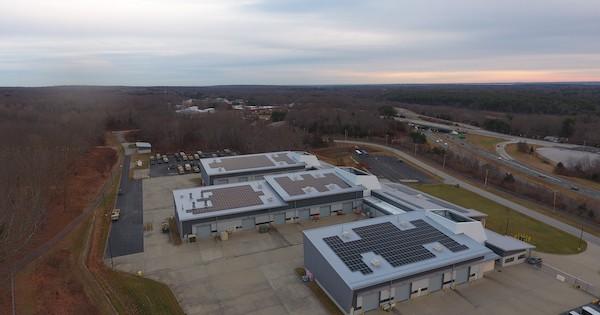In Short : Chile’s $2 billion investment in energy storage challenges U.S. supremacy in the field. This substantial funding signals Chile’s commitment to advancing energy storage technologies, which are pivotal for integrating renewable energy sources into the grid effectively. By making significant strides in energy storage, Chile aims to bolster its renewable energy capacity, reduce dependence on fossil fuels, and pave the way for a more sustainable energy future. This initiative not only strengthens Chile’s position in the global clean energy landscape but also encourages innovation and competition in the sector.
In Detail : The Rhode Island National Guard reduced its annual electricity bill by $100,000 following the installation of a SolarEdge DC-optimized rooftop solar installation at its Camp Fogarty base.
Following the installation of a 550kWp SolarEdge DC-optimized rooftop installation on its heavy equipment maintenance facility at Camp Fogarty in East Greenwich, RI, the Rhode Island National Guard has achieved a $100,000 reduction in its annual electricity bill.
In its first 12 months of operation, the 1364-module system, which provides energy to the repair facility where equipment like tanks, trucks and cannons are serviced and rebuilt, produced 935kWh of clean, renewable energy. This has offset around two-thirds of the site’s total annual electricity use and reduced carbon emissions by 742,000 lbs of coal burned.
“For us, installing solar is about reducing our carbon footprint, which is a directive from the President of the United States, and also about our own commitment to being good stewards,” said Lt Col Patrick Altsman, Rhode Island National Guard. “At the same time, we want to become more energy independent and build resiliency so that when the power goes out we can use solar in lieu of generators. Looking ahead, we plan to incorporate backup battery technology into the system, to further solidify the energy infrastructure at the site.”
The Camp Fogarty system is comprised of five 100kW SolarEdge three-phase inverters and SolarEdge P860 Power Optimizers which are installed on each pair of modules. The SolarEdge solution maximizes solar energy production by overcoming shading challenges from nearby trees which limit production in traditional, non-DC-optimized solutions. Additionally, the Power Optimizers provide highly granular, real-time information on system performance at a module level, enabling rapid fault detection and mitigation.
The installation at Camp Fogarty is the third SolarEdge project to support Rhode Island’s “Lead by Example” initiative, where state agencies and municipal governments lower greenhouse gas emissions and reduce energy costs across the state through investments in energy efficiency, renewable energy, and clean transportation. At Capitol Hill in Providence, three State buildings are outfitted with SolarEdge rooftop systems, as is the Division of Public Utilities and Carriers in Warwick.
“SolarEdge was specified for this and the other projects in Rhode Island by the State’s Office of Energy Resources (OER),” explains Stuart Flanagan, Principal, Newport Renewables, the company that engineered and installed the system. “In addition to SolarEdge’s higher energy optimization and multi-layered safety features, the OER values the convenience of being able to monitor its newest solar installations in a single portal. This ensures technical issues can be identified and resolved quickly, which helps keep maintenance costs, and potential energy losses, to a minimum.”
The Camp Fogarty project, which was funded primarily from the Federal Government, also received a grant from CommerceRI’s Renewable Energy Fund (REF), which was set up to help expand the role of renewable energy throughout Rhode Island, while stimulating job growth in the green technology and energy sectors.
“Rhode Island Commerce is proud to have supported this important project for the National Guard and Camp Fogarty,” says William Ash, Interim President & COO of Rhode Island Commerce. “Renewable energy projects such as this not only save money, but create and maintain jobs, educate, are better for the environment, and bring us closer to achieving our goals of mitigating climate change and its impacts on our planet.”

